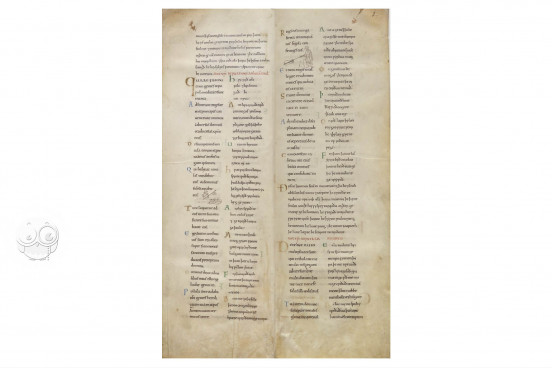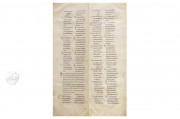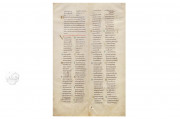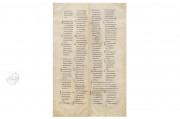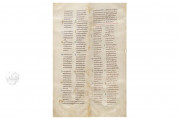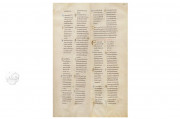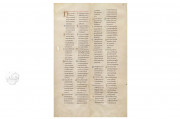The Paris Psalter, made in England in the mid-eleventh century, is a copy of the Roman psalter with additional texts for private devotion in Latin and Old English. The book has lost ten to twelve miniatures that were removed and subsequently lost sometime during the fifteenth or sixteenth centuries. No known copies of the artwork remain, but written accounts describe a picture of David playing the harp on the missing first leaf. Another thirteen small pen and ink drawings remain; these appear in gaps between the Latin psalms through the first six folios.
The Paris Psalter is in an unusual format, being extremely tall and narrow. Furthermore, based on the use of pronouns in the text, the patron was likely a wealthy woman of the laity. Books for private devotion were often made for women, and this book is an early example. Finally, a colophon names Wulfwinus as the scribe, a rare piece of information about book production in preconquest England.
Thirteen Lively Pen and Ink Drawings
The surviving artwork in the Paris Psalter comprises small vignettes that fill the gaps between verses in the Latin version of the psalms. The style and iconography are consistent with eleventh-century English illumination and have drawn comparisons to the Utrecht Psalter, although there is no direct connection between them. The only evidence that remains of the missing folios is a fragment of an acanthus border that is a good match to Winchester manuscripts of the same period and some ghostly offsets onto the pages once opposite the pictures. One offset indicates the opposite page had a full-page illumination (fol. 176v), and it is a great pity it is gone for the unusual vertical format of the page would have required an innovative composition to fill the space.
Only Version of Old English Prose Psalms
The text of the Paris Psalter is arranged in two columns of forty-five lines each. The Latin version is written in the left column, and the Old English translation is written on the right. At times, a block of Old English text is written across both columns. The Latin Psalms 1-50 are translated into Old English prose paraphrases, and the remaining Old English translations are metrical. The fifty prose translations have been attributed to King Alfred the Great. The metrical translations were written by an unknown poet.
Taken to France by Jean, Duke of Berry
The early life of the Paris Psalter is unknown, but stylistic comparisons of the drawings to Winchester manuscripts suggest it was made at Winchester. It is assumed to have remained in England until the early fifteenth century, when it was removed to France by Jean, Duke of Berry. The manuscript is listed in the ducal inventory of 1402, and the duke's signature has been added below the colophon. A description from this time indicates the manuscript was complete.
The book entered the library of Sainte-Chapelle in Bourges by July 1406. An inventory of 1708 describes the general neglect of the collection and identifies an early English manuscript, probably the Paris Psalter. A more detailed description of 1752, when the manuscript was given by the canons of Saint-Chapelle to the French royal library, matches the book's current state. The manuscript subsequently entered the Bibliothèque nationale (now the Bibliothèque nationale de France).
We have 1 facsimile edition of the manuscript "Paris Psalter": The Paris Psalter facsimile edition, published by Rosenkilde and Bagger, 1958
Request Info / Price
